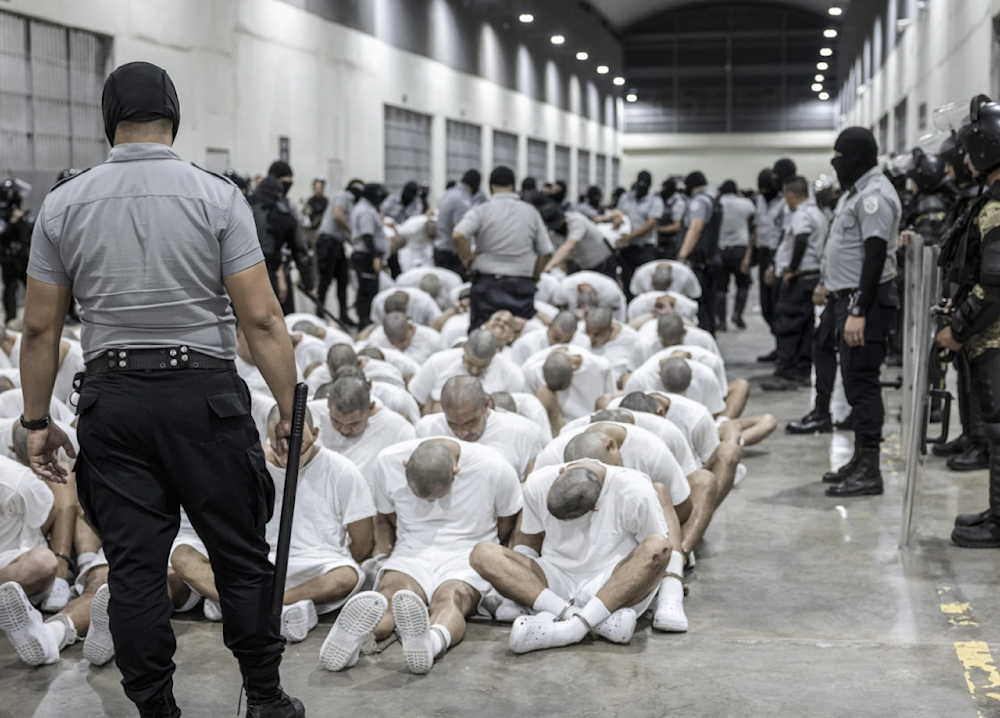El Salvador arrests human rights lawyer supporting deported migrants
The arrest of Ruth Eleonora Lopez, a prominent human rights lawyer and critic of President Nayib Bukele, has sparked heightened concerns about rising authoritarianism in El Salvador.
-

A prison guard transfers deportees from the US to the Terrorism Confinement Center in Tecoluca, El Salvador on March 16, 2025. (AP)
Police in El Salvador have arrested Ruth Eleonora Lopez, a prominent human rights lawyer and vocal critic of President Nayib Bukele, prompting widespread condemnation from rights organizations and renewed concerns over the country's democratic backsliding.
Lopez, 47, leads the anti-corruption and justice unit at Cristosal, a human rights group that supports Venezuelan migrants deported by the US. She has also publicly opposed Bukele’s controversial anti-crime campaign, which has led to mass arrests of alleged gang members and has drawn international scrutiny.
According to El Salvador’s public prosecutor, Lopez was arrested late Sunday on charges of embezzling public funds during her time working for the country’s electoral court over a decade ago. However, critics say the arrest is politically motivated and part of a broader crackdown on dissent.
Cristosal reported that neither Lopez’s family nor her legal team has been able to determine her whereabouts, calling the authorities’ refusal to provide information or allow legal access “a blatant violation of due process.”
A coalition of rights groups, including Amnesty International, condemned the arrest, describing it as further evidence of rising authoritarianism under Bukele, a close ally of President Donald Trump.
Her arrest "raises serious concerns about the increasing risks faced by human rights defenders in El Salvador," the organizations said in a joint statement.
World's 'coolest dictator'
Bukele remains highly popular domestically, largely due to his aggressive approach to combating gangs, but has drawn criticism for consolidating power and undermining democratic institutions. He has previously referred to himself as “the world’s coolest dictator.”
Lopez's international profile has grown in recent years; she was named to the BBC’s list of 100 most inspiring and influential women in the world in 2023, praised for her commitment to justice and legal reform.
A coalition of more than a dozen human rights organizations, including Amnesty International and Human Rights Watch, issued a joint statement condemning the arrest of Lopez and calling for her immediate release.
The statement criticized El Salvador’s ongoing “state of exception,” saying it has been used not only to combat gang violence but also to suppress dissent, adding that "authoritarianism has increased in recent years as President Nayib Bukele has undermined institutions and the rule of law, and persecuted civil society organizations and independent journalists."
In March, using rarely invoked wartime powers, the Trump administration flew the Venezuelans to El Salvador without court hearings, accusing them of gang ties—allegations their families and lawyers strongly reject. El Salvador was reportedly paid by the US to detain them.
Last week, a law firm representing the Venezuelan migrants on behalf of the Caracas government alleged that the detainees had been subjected to both physical and psychological torture.
Crackdown on critics and migrant advocates
In a separate incident, Cristosal reported that police officers entered its headquarters in late April during a press conference, photographing and filming the premises, members of the media, and vehicles belonging to staff. The organization described the event as part of the ongoing climate of "authoritarianism, the closure of democratic spaces in El Salvador."
Meanwhile, El Salvador’s human rights commissioner, Andres Guzman, who had previously defended Bukele’s controversial anti-gang crackdown, announced his resignation on Monday.
Guzman, a Colombian lawyer, did not disclose the reason for his departure but said he had been “a privileged witness to a historic transformation” of the country from what he described as a past marked by “chaos and despair.”

 4 Min Read
4 Min Read








